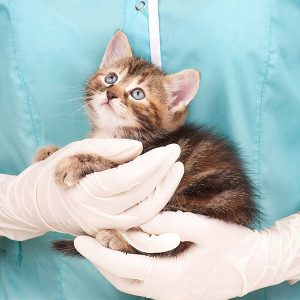New Kitten Pack
NEW KITTEN OWNER?
Dear new kitten parent,
Congratulations on the newest addition to your family! We understand how important your cat is to you, and we are committed to providing you and your pets with excellent care.
The following information is oriented toward kittens, but most of it applies to older cats as well, so you may find it useful if you have a new cat of any age. The information here is an overview. Please click the links in the sections below for more detailed information. If you have any questions or concerns, do not hesitate to contact us.

Kittens require a series of vaccines in their early months to protect them from serious disease. After the kitten reaches adulthood, its vaccines are updated at intervals to ensure continued protection.
Rabies-This is a fatal and zoonotic (transmitted to humans) disease of all mammals. Rabies is transmitted from the saliva of infected wildlife and domestic animals. Kittens should receive 1 dose as early as 12 weeks of age. This vaccine is required by state law.
FVRCP- This vaccine prevents three potentially deadly airborne viruses: rhinotracheitis, calicivirus and panleukopenia. The vaccine is given every 3 to 4 weeks until the kitten is at least 16 weeks old. It is boostered a year later, and then given every 3 years. For more information about the FVRCP vaccine, please click here.
FELV-(Feline Leukemia) may be appropriate for your kitten if it has contact with other cats. We can discuss this optional vaccine during your first visit.
Fecal Samples- We recommend checking at least two fecal samples between 8 and 16 weeks of age. Intestinal parasites shed in cycles so we like to check two fecal samples to make sure your kitten is parasite free. We recommend routinely deworming your kitten, as directed by a veterinarian.
Spay/Neuter- Spaying or neutering your pet is recommended. This should be discussed with your veterinarian regarding appropriate timing, and any questions you may have. We require pre-operative blood work before surgery to ensure your kitten is healthy before anesthesia.
Home Again- We recommend microchipping your pet at or before time of spay/neuter in case your pet gets lost or stolen. For more information on Home Again and microchiping, please click here.
Poisonous plants and toxins- Every home contains a variety of everyday items and substances that can be dangerous or even fatal if ingested by dogs and cats. You can protect your pet’s health by becoming aware of the most common health hazards found in many pet-owning households. Call your veterinarian immediately if your pet ingests a hazardous plant. Do not try and self medicate your pet, or try to induce vomiting without consulting your veterinarian first. For more information about poisonous plants and toxins, please click here.
